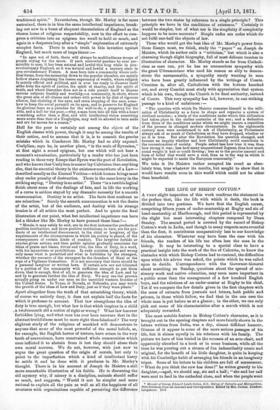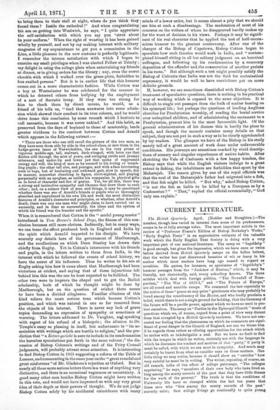THE LIFE OF BISHOP COTTON.*
A VERY slight inspection of this work confirms the statement in the preface that, like the life with which it deals, the book is divided into two portions. We have first the English career,. comprising fifteen years of under-mastership at Rugby and six of head-mastership at Marlborough, and this period is represented by the slight but most interesting chapters composed by Dean Stanley. The second period is covered by the record of Bishop. Cotton's work in India, and though in many respects more eventful than the first, it contributes comparatively less to our knowledge of his character. Whatever may have been the case with his friends, the readers of his life too often lose the man in the bishop. It may be interesting to a special class to have s practical insight into the work of the See of Calcutta, to know the obstacles with which Bishop Cotton had to contend, the difficulties- upon which his advice was asked, the points which he was called: upon to decide. Correspondence with the Governor-General about marching on Sunday, questions about the spread of mis- sionary work and native education, may seem more important its a public sense than the management of a few hundred English boys, and the relations of an under-master at Rugby to his chief- Yet if we compare the few details given in the first chapters with the mass of extracts from journals and letters, both public and private, in those which follow, we find that in the one case the whole man is put before us at a glance ; in the other, we can only pick out some of his characteristics after a search which is not adequately rewarded.
The most notable feature in Bishop Cotton's character, as it is brought out in the opening chapters and more faintly shown in the letters written from India, was a dry, almost diffident humour. Gleams of it appear in some of the more serious passages of his life, but it shines equally in his relations with his family. The picture we have of him buried in the recesses of an arm-chair, and apparently absorbed in a book or in some business, while all the time he was pouring out a stream of fun indescribably comic and original, for the benefit of his little daughter, is quite in keeping with his Cambridge habit of arranging his friends in an imaginary tripos. Some of his letters to his children are full of amusement. " What do you think the cow has done?" he writes gravely to his, daughter,—aged, we should say, six and a half ; " she and her calf were sent to feed in the cathedral close, and when the people went • Memoir of George Edward Lynch Cotton, D.D , BisUp of Calcutta and Metropolitan- With Selediora from his Journals and Corrapondenx. Edited by Mrs. Cotton. London: Longman. 1571 to bring them to their stall at night, where do you think they found them ? Inside the cathedral !" And when congratulating Ids son on getting into Woolwich, he says, " I quite appreciate the self-satisfaction with which you say you 'strut about in your uniform.' When the right of wearing it has been gained wholly by yourself, and not by my making interest with military magnates of my acquaintance to get you a commission in the Line, a little pleasure in the new costume is perfectly legitimate. I remember the intense satisfaction with which I began to exercise my small privileges when I was elected Fellow at Trinity ; my delight in using the college plate when entertaining my friends -at dinner, or in giving orders for the library ; nay, even the secret -chuckle with which I walked over the grass-plots, forbidden to less exalted persons." But it is in earlier life that this humour -comes out in a more characteristic fashion. While Cotton was a boy at Westminster he was celebrated for the manner in which he deterred others from bullying by the employment of a sort of Socratic irony. If they were too strong for tim to check them by direct means, he would, as a friend of his tells us, " lead them unawares into some admis- aion which showed their conduct in its true colours, and he would -drive home this conclusion by some remark which I hesitate to ,call sarcastic, because it was never unkind." And this habit, as preserved from the days of boyhood to those of mastership, lends greater vividness to the contrast between Cotton and Arnold which appears in the following extract :— " There are those who can still recall the picture of the two men, as they have seen them side by side in the school-close, or met them in the ledge-grown lanes of Warwickshire, the one in the very prime of vigorous middle-age' tall, stalwart, dark-visaged, with keen eye that Sashes still through the mist of years, and swinging stride and prompt -utterance, and under-lip and lower jaw that spoke of suppressed energy and will, the king of men as he seemed to his loving or tremb- ling pupils; the other tall also, and younger, and with a face interesting even to boys, but of hesitating and awkward gait., slow in speech, dry in manner, somewhat slouching in figure, short-sighted, and playing perpetually with an eyeglass, as unlike his companion in physical gifts as in force of character and fire of genius. Yet, for all this, there was a strong and instinctive sympathy and likeness that drew them to each other • and, on a calmer view of men and things, it may be questioned whether there was one of Arnold's friends or pupils who so thoroughly Absorbed and reproduced in his own life and work the moat distinctive features of Arnold's character and principles, or whether, after Arnold's death, there was any one man who might claim to have carried out so earnestly, and in time so successfully, the ideas and the system of which his friend was the founder and the apostle."
When it is remembered that Cotton is the " model young master" introduced in Tom Brown's School Days, the fitness of this con- clusion becomes still more obvious. Indirectly, but in many ways, we can trace the effect produced both in England and India by the spirit which Arnold imparted to his disciple. We have scarcely any details here of the government of Marlborough, and the recollections on which Dean Stanley has drawn date 'chiefly from Rugby. Yet in Cotton's intercourse with his friends and pupils, in the letters written to them from India, in the interest-with which he followed the events of school history, we have the secret of his influence. Thus he writes to his son at Rugby asking him how it came about that Marlborough had been -victorious at cricket, and saying that of three injunctions left behind him this was the one he least expected to be fulfilled. The -other two were to improve the chapel and to get the Balliol -scholarship, both of which he thought might be done by Marlborough, but on the question of cricket there seems to have been a divided allegiance. Familiar allusions of this bind relieve the more serious tone which became Cotton's position, and which was natural in one so far removed from the objects of his interest. There is never any lack of grave topics demanding an expression of sympathy or sometimes of warning. The letters addressed to Dr. Vaughan, ana speaking with regret of his refusal of a bishopric ; the allusion to Dr. Temple's essay as pleasing in itself, but unfortunate in " its as- sociation with writings which are hostile to religion," and the pre- -diction that " a Ketzer-yericht is sure to include in its condemnation the harmless speculations put forth in the same volume ;" the dis- cussion of Bishop Colenso's writings and of the Privy Council judgments, will probably attract some attention. It is interesting to find Bishop Cotton in 1865 suggesting a reform of the Table of Lessons, and commenting in the same year on the " great scandal and great misfortune "of Mr. Gladstone's rejection at Oxford. But in mearly all these more serious letters there is a want of anything very -distinctive, and there is an occasional vagueness or uncertainty. A good many other men besides Bishop Cotton might have written an this vein, and would not have impressed us with any very great idea of their depth or their powers of thought. We do not judge Bishop Cotton solely by his accidental coincidence with many
minds of a lower order, but it seems almost a pity that we should see him at such a disadvantage. The moderation of most of his censures on the writers of whom he disapproved hardly makes up for the want of decision in his views. Perhaps it may be signifi- cant of his real character that he applied the test of half-uncon- scious humour to the greatest controversy. After one of the charges of the Bishop of Capetown, Bishop Cotton began to speculate how such theories would work in India, and " contem- plated himself sitting in all but solitary judgment on an heretical suffragan, and following up his condemnation by a summary deposition of the offender and.the consecration of another prelate in his room." But although such a test might possibly satisfy the Bishop of Calcutta that India was not the field for ecclesiastical supremacy, it would be well to have convictions put on more definite grounds.
If, however, we are sometimes dissatisfied with Bishop Cotton's treatment of speculative questions, there is nothing in his practical way of working which is exposed to the same objection. It is difficult to single out passages from the bulk of matter bearing on his episcopal life ; but perhaps the questions of lending Anglican churches for Presbyterian worship, of reading the burial service over unbaptized children, and of administering the sacrament to a Presbyterian, present him in the most favourable light. Of the general administration of his diocese this is hardly the place to speak, and though the memoir contains many details on that subject, they are not put in such a way as to be clearly apprehended by lay readers. The glimpses we have of the Bishop in his study merely tell of a great amount of work done under unfavourable conditions. His journeys are sometimes marked by vivid descrip- tions of scenery and singular experiences of native habits. After sketching the Vale of Cashmere with a few happy touches, the Bishop says that while the English visitors indulge to a great extent in fishing, the inhabitants are forbidden that sport by the Maharajah. The reason given by one of the royal officials was that the soul of the Maharajah's father had migrated into a fish, and that fish might be killed. " But why," asked Bishop Cotton, " is not the fish as liable to be killed by a European as by a Cashmerian ?" "That," replied the official reverentially, " God only can explain."



































 Previous page
Previous page